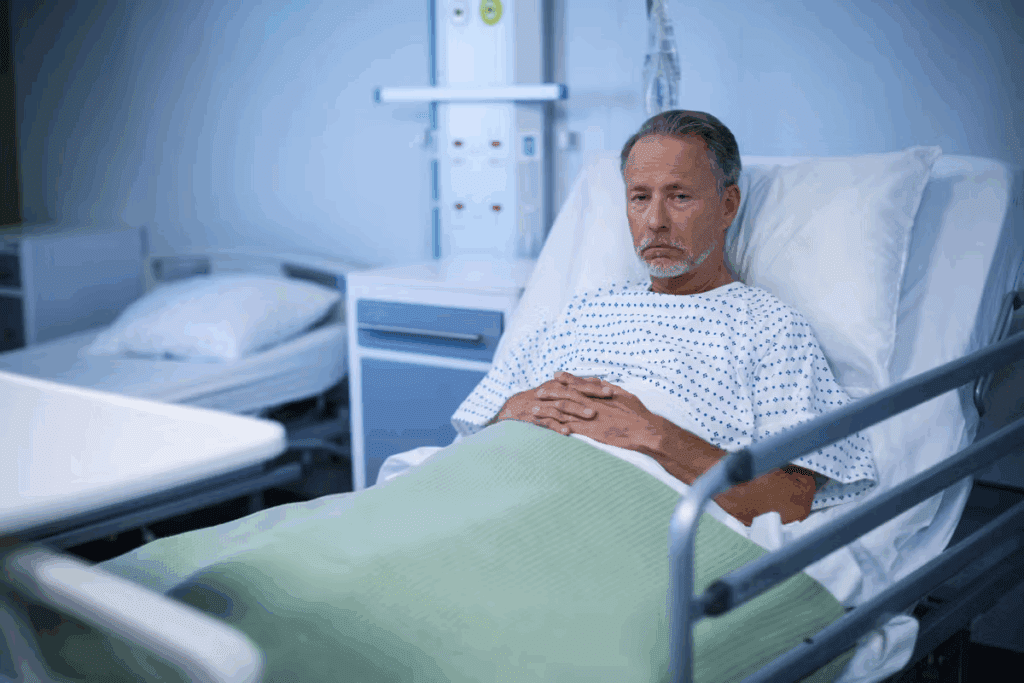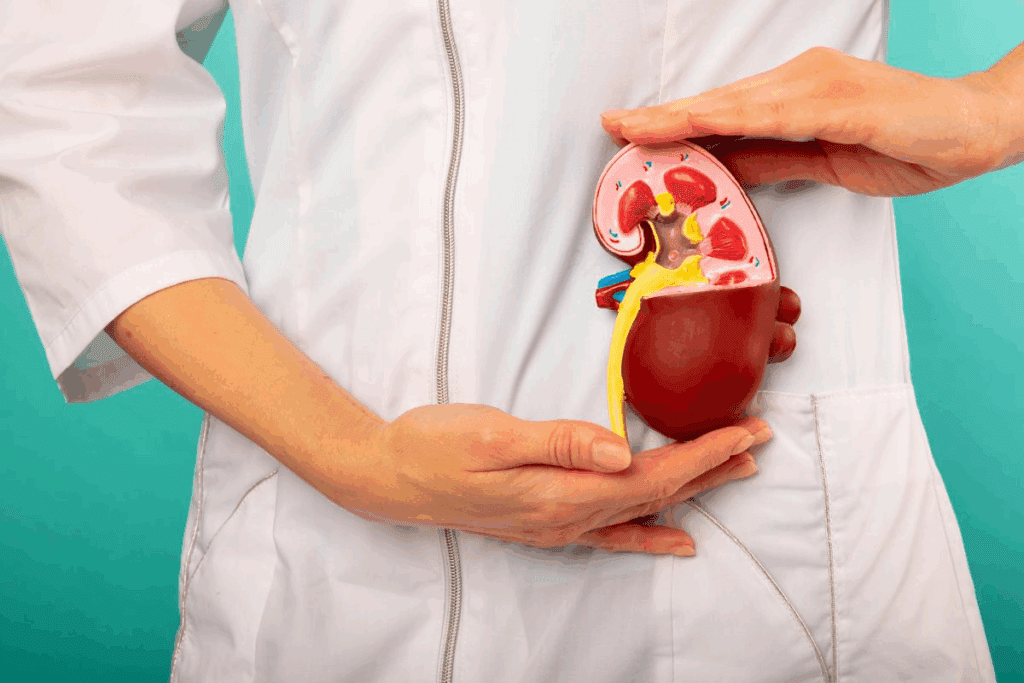
Kidney stones are solid mineral deposits that form in the kidneys. They happen when crystals accumulate and crystallize. These stones are known for causing intense pain in the urinary tract. But, their impact can also extend beyond the kidneys.
At Liv Hospital, we focus on giving patients trustworthy medical advice. We help them understand if symptoms are just coincidental or related to their condition. Research shows that kidney stones and gastrointestinal disturbances, like diarrhea, might be connected through the body’s systems.
It’s important to know how kidney stones and diarrhea are linked. We’ll look into this complex relationship. We’ll examine the evidence and offer advice for those with abdominal symptoms.
Key Takeaways
- Kidney stones can cause a range of symptoms beyond intense pain.
- Gastrointestinal disturbances, such as diarrhea, can be related to kidney stones.
- The connection between kidney stones and diarrhea is complex and multifaceted.
- Understanding this relationship is key for effective management and treatment.
- Patients experiencing abdominal symptoms should seek detailed medical guidance.
Understanding Kidney Stones: Formation and Types

Kidney stones are hard, painful deposits that form in the kidneys. They are made of minerals and salts in urine. This happens when there’s more crystal-forming substance than the urine can dilute.
What Are Kidney Stones?
Kidney stones, also known as renal calculi, form when urine’s composition is off balance. This imbalance causes minerals like calcium oxalate, calcium phosphate, and uric acid to crystallize. These stones can be any size and cause a lot of pain as they move through the urinary tract.
Common Types of Kidney Stones
There are several types of kidney stones, each with different causes and risk factors.
- Calcium Stones: The most common type, often made of calcium oxalate.
- Uric Acid Stones: Formed in people who lose too much fluid because of chronic diarrhea or malabsorption, those who eat a high-protein diet, and those with diabetes or metabolic syndrome.
- Struvite Stones: Typically occur in people with urinary tract infections (UTIs).
- Cystine Stones: Rare and usually run in families.
Risk Factors for Kidney Stone Development
Several factors can increase the risk of developing kidney stones. These include:
- Family or Personal History: Having a family history of kidney stones increases your risk.
- Dehydration: Low fluid intake can concentrate minerals in the urine, promoting stone formation.
- Diet: Consuming a diet high in sodium, animal protein, and oxalate-rich foods can increase the risk.
- Obesity: Being overweight or obese is linked to an increased risk of kidney stone formation.
- Digestive Diseases: Conditions like Crohn’s disease or ulcerative colitis can increase the risk due to malabsorption and diarrhea.
Research shows that chronic diarrhea can increase the risk of kidney stone formation. This is because dehydration concentrates urine, promoting stone development.
Common Symptoms of Kidney Stones

Knowing the symptoms of kidney stones is key for quick diagnosis and treatment. These stones can cause various symptoms that affect daily life a lot.
Primary Symptoms: Pain and Urinary Changes
The main symptom is sharp, intense pain in the side, lower back, or abdomen. This pain can move to the groin. It’s often described as one of the worst pains.
Urinary changes are also important signs. These can include:
- Frequent urination
- Painful urination
- Blood in the urine
- Cloudy or foul-smelling urine
Secondary Symptoms: Nausea and Vomiting
Nausea and vomiting often happen because of the pain from kidney stones. The pain can upset the stomach and cause these symptoms.
When to Seek Medical Attention
See a doctor if you have any of these symptoms:
| Symptom | Description |
| Severe pain | Pain that is unbearable and doesn’t subside |
| Fever and chills | Indicates possible infection |
| Blood in urine | Visible blood or urine that is cloudy or foul-smelling |
| Difficulty urinating | Painful urination or inability to urinate |
Spotting these symptoms early and getting medical help can greatly improve treatment outcomes for kidney stones.
The Relationship Between Digestive Issues and Kidney Stones
Medical research is now focusing on how kidney stones and digestive health are connected. It shows that kidney stones can really affect our digestive system.
How Kidney Stones Affect the Digestive System
Kidney stones can lead to digestive problems. The pain from kidney stones can mess with our nervous system. This can change how our digestive system works.
The pain and discomfort from kidney stones can also cause nausea and vomiting. This makes digestive health even harder to manage.
Common Gastrointestinal Symptoms During Kidney Stone Episodes
When someone has a kidney stone, they might feel sick in their stomach. They could experience:
- Nausea and vomiting
- Changes in bowel habits
- Abdominal discomfort
Even though diarrhea isn’t a main symptom, some people might get it. This is because the pain from kidney stones can affect our digestive system.
The Shared Nervous System Connection
The urinary and digestive systems use the same nervous system. This can make things complicated when we have kidney stones. It can cause stomach problems during these episodes.
| Symptom | Possible Cause |
| Nausea and Vomiting | Pain and discomfort from kidney stones |
| Changes in Bowel Habits | Activation of the nervous system due to kidney stone pain |
| Abdominal Discomfort | Referred pain from the urinary tract |
It’s important to understand this connection. It helps us manage both kidney stone symptoms and digestive problems better.
Does Kidney Stones Cause Diarrhea? Examining the Evidence
To understand if kidney stones cause diarrhea, we need to look at the medical evidence. We will check the research and what experts say to get to the bottom of this.
Medical Research on Kidney Stones and Diarrhea
Many studies have looked into kidney stone symptoms. Pain and changes in urine are common, but diarrhea is not often mentioned.
A study in the Journal of Urology found only a few patients with kidney stones had diarrhea. This shows diarrhea is not a main symptom of kidney stones.
Indirect Connections Between Kidney Stones and Bowel Function
Kidney stones might not directly cause diarrhea, but there are indirect links. The pain from kidney stones can upset digestion.
Stress and anxiety from kidney stone episodes can also affect bowel function. This might lead to diarrhea in some people.
Why Diarrhea Is Not a Primary Symptom of Kidney Stones
The main symptoms of kidney stones are pain and changes in urine. Diarrhea is usually seen as a secondary effect, not a main symptom.
What Medical Professionals Say About This Connection
Doctors find the link between kidney stones and diarrhea complex. Chronic diarrhea can raise the risk of kidney stones. But, there’s no strong proof that kidney stones directly cause diarrhea.
| Condition | Primary Symptoms | Secondary Symptoms |
| Kidney Stones | Pain, Urinary Changes | Nausea, Vomiting, Diarrhea |
| Chronic Diarrhea | Frequent Diarrhea | Dehydration, Mineral Imbalances |
In conclusion, while there’s a link between kidney stones and diarrhea, the evidence doesn’t show a direct cause. Most of the time, kidney stones don’t directly lead to diarrhea.
Why Diarrhea Might Occur During Kidney Stone Episodes
Diarrhea during kidney stone episodes can be caused by several factors. These include pain, medication side effects, and health conditions. Pain and medication can upset the digestive system, leading to diarrhea.
Pain-Induced Digestive Disturbances
Kidney stone pain can really upset the body. It can mess with the digestive system, causing diarrhea.
Key factors contributing to pain-induced digestive disturbances include:
- The body’s stress response to pain, which can alter digestive processes
- The release of hormones that affect bowel movements
- Increased sensitivity of the digestive system during episodes of pain
Medication Side Effects from Pain Relievers
Pain meds for kidney stones can upset the stomach. They can change how often you go to the bathroom, leading to diarrhea.
Common side effects of pain relievers include:
- Nausea and vomiting
- Changes in bowel movements, such as diarrhea or constipation
- Abdominal pain or discomfort
Concurrent Conditions That May Cause Confusion
Other health issues can also cause diarrhea with kidney stones. It’s important to figure out if the diarrhea is from the stones or another health problem.
Stress and Anxiety Responses to Kidney Stone Pain
The pain from kidney stones can also stress you out. This stress can mess with your digestion, causing diarrhea.
Stress management techniques that may help alleviate digestive symptoms include:
- Deep breathing exercises
- Meditation or mindfulness practices
- Seeking support from healthcare professionals
How Chronic Diarrhea Can Contribute to Kidney Stone Formation
We look into how chronic diarrhea can raise the risk of kidney stones. It can cause dehydration, making urine more concentrated and stone-prone. This makes it hard for the body to absorb minerals and water, leading to more stone-forming substances in urine.
Dehydration and Urine Concentration Mechanisms
Dehydration is key in forming kidney stones. Excessive water loss from diarrhea makes urine more concentrated. This increases the chance of minerals turning into stones. Staying hydrated is essential to keep urine diluted and lower stone risk.
Mineral Imbalances Resulting from Chronic Diarrhea
Chronic diarrhea changes how the body absorbs minerals like calcium, oxalate, and citrate. These minerals are important in preventing stones. For example, too much oxalate in urine can lead to stone formation.
The Role of Intestinal Inflammation
Intestinal inflammation from chronic diarrhea can change the gut’s environment. It may increase the absorption of minerals that contribute to stones. This complex interplay between gut health and kidney function shows why managing digestive issues is vital.
Preventive Measures for Those with Chronic Digestive Issues
For those with chronic diarrhea, prevention is key. Drinking plenty of water, managing diarrhea with diet or meds, and watching mineral intake are important. A balanced diet and adequate hydration are essential in preventing stones.
Distinguishing Between Kidney Stone Symptoms and Other Conditions
Kidney stones and other gastrointestinal disorders can share similar symptoms. This makes it hard to tell what’s causing the problem. We must look closely at the symptoms to figure out the real cause.
Kidney Stones vs. Gastrointestinal Disorders: Key Differences
Kidney stones and gastrointestinal disorders can both cause severe pain and changes in bowel habits. But, the pain’s location and other symptoms can tell us which one it is.
Key differences:
- Location of pain: Kidney stone pain starts in the back or side and moves to the lower abdomen. Gastrointestinal disorder pain is usually in the middle of the abdomen.
- Urinary symptoms: Kidney stones can cause painful urination or blood in the urine. These symptoms are less common in gastrointestinal disorders.
- Nausea and vomiting: Both conditions can make you feel sick and want to vomit. But, these symptoms are more often linked to the stomach and intestines.
When to Suspect Kidney Stones vs. Digestive Issues
We look at how severe and long-lasting the pain is, and any changes in how you urinate. If the pain is intense, moves from the back to the abdomen, and you have urinary symptoms, kidney stones might be the cause.
Diagnostic Approaches and Tests
To diagnose kidney stones, we look at your medical history, do a physical exam, and use tests. We use CT scans or ultrasounds to see the stones and where they are.
Diagnostic tests:
- Imaging studies (CT scans, ultrasounds)
- Urine analysis to check for blood or infection
- Blood tests to check how well your kidneys are working
The Importance of Accurate Diagnosis
Getting the right diagnosis is key to treating the problem. We use a mix of clinical checks and tests to find the best treatment plan.
By knowing the differences between kidney stone symptoms and other conditions, we can give better care. This helps improve how well patients do.
Treatment Options for Kidney Stones and Associated Symptoms
Treating kidney stones involves several steps. These include managing pain, helping the stone pass, and preventing more stones. The main goal is to make the patient comfortable and stop stones from coming back.
Medical Interventions for Kidney Stones
Medical treatments are key in managing kidney stones. First, doctors use painkillers to ease the discomfort. For bigger stones, treatments like shock wave lithotripsy or surgery might be needed.
The American Urological Association says treatment depends on the stone’s size and location. It also depends on the patient’s health.
“For patients with stones that are too large to pass on their own, or that are causing significant obstruction or pain, surgical intervention may be required.”
Managing Digestive Symptoms During Kidney Stone Episodes
It’s also important to manage digestive symptoms during a stone episode. While diarrhea is rare, some people might feel sick to their stomach. Staying hydrated and adjusting your diet can help.
| Symptom | Management Strategy |
| Nausea and Vomiting | Anti-nausea medication, hydration |
| Diarrhea | Dietary adjustments, hydration |
| Abdominal Pain | Pain management medication |
Dietary Modifications to Prevent Recurrence
Changing your diet can help prevent new stones. Eating less oxalate, drinking more water, and eating a balanced diet are good steps. A healthcare provider or dietitian can help create a diet plan for you.
- Increase fluid intake to at least 8-10 glasses of water per day
- Reduce sodium intake to minimize calcium in the urine
- Avoid foods high in oxalate if you have calcium oxalate stones
Hydration Strategies for Prevention
Drinking enough water is key to preventing stones. Water helps dilute the urine, making it less likely for minerals to form stones. Aim for 8-10 glasses of water a day.
Knowing about treatment options and taking preventive steps can help manage kidney stones. This way, you can reduce the chance of getting more stones in the future.
Conclusion: Understanding the Complex Relationship Between Kidney Stones and Digestive Health
We’ve looked into how kidney stones and digestive health are connected. This connection is complex, with many factors at play. Dehydration, mineral imbalances, and shared nervous system links all play a role.
It’s key to understand this relationship to manage and prevent kidney stones. Chronic diarrhea, for example, can lead to dehydration. This can increase the risk of kidney stones by changing mineral balances in the body.
Knowing how kidney stones and digestive health interact helps us take action. We can prevent kidney stones and manage symptoms better. This includes drinking enough water, changing our diet, and getting medical help when needed.
Our conversation shows the need for a complete approach to dealing with kidney stones. This approach must consider both the urinary and digestive systems. By doing this, we can prevent and treat kidney stones more effectively, improving our health.
Can kidney stones cause diarrhea?
Diarrhea is not a common symptom of kidney stones. But, it might happen during an episode. This could be due to intense pain, side effects from medication, or other health issues.
How do kidney stones affect the digestive system?
Kidney stones can lead to nausea and vomiting because of the severe pain. The pain affects the shared nerves of the urinary and digestive systems. This can cause digestive symptoms.
Can chronic diarrhea increase the risk of kidney stone formation?
Yes, chronic diarrhea can raise the risk of getting kidney stones. It does this by causing dehydration, making urine more concentrated, and upsetting mineral balances.
What are the primary symptoms of kidney stones?
The main symptoms of kidney stones include sharp pain in the side, lower back, or abdomen. You might also feel the need to urinate often, experience painful urination, see blood in your urine, and have cloudy or foul-smelling urine.
How can I prevent kidney stone recurrence?
To prevent kidney stones from coming back, stay hydrated, cut down on oxalate, manage digestive issues, and make dietary changes. These steps can help lower your risk.
Do kidney stones cause nausea and vomiting?
Yes, nausea and vomiting are common symptoms of kidney stones. They happen because of the severe pain.
Can kidney stones be confused with other gastrointestinal disorders?
Yes, it can be hard to tell if you have kidney stones or another digestive issue. Symptoms can be similar, so getting a correct diagnosis is key.
What is the relationship between dehydration and kidney stone formation?
Dehydration makes urine more concentrated. This increases the chance of minerals forming stones. So, dehydration raises the risk of getting kidney stones.
How are kidney stones diagnosed?
Doctors use different tests to figure out if you have kidney stones. They then create a treatment plan based on the diagnosis.
Can managing digestive symptoms help during a kidney stone episode?
Yes, managing digestive symptoms is important when you have a kidney stone. There are treatments available to help with these symptoms.
Are there different types of kidney stones?
Yes, there are several types of kidney stones. These include calcium, uric acid, struvite, and cystine stones. Each type has its own causes and treatments.
FAQ
References
National Center for Biotechnology Information. Does Kidney Stones Cause Diarrhea What You Need https://www.ncbi.nlm.nih.gov/pmc/articles/PMC11491232/


































